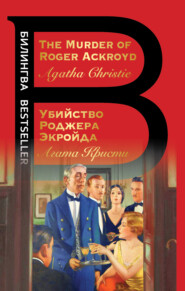По всем вопросам обращайтесь на: info@litportal.ru
(©) 2003-2024.
✖
Зло под солнцем / Evil Under the Sun
Настройки чтения
Размер шрифта
Высота строк
Поля
She broke off, finding it difficult to explain her meaning.
“It is romantic, yes,” agreed Hercule Poirot. “It is peaceful. The sun shines. The sea is blue. But you forget, Miss Brewster, there is evil everywhere under the sun.”
The clergyman stirred in his chair. He leaned forward. His intensely blue eyes lighted up.
Miss Brewster shrugged her shoulders.
“Oh! of course I realize that, but all the same – ”
“But all the same this still seems to you an unlikely setting for crime? You forget one thing, Mademoiselle.”
“Human nature, I suppose?”
“That, yes. That, always. But that was not what I was going to say. I was going to point out to you that here every one is on holiday.”
Emily Brewster turned a puzzled face to him. “I don’t understand.”
Hercule Poirot beamed kindly at her. He made dabs in the air with an emphatic forefinger.
“Let us say, you have an enemy. If you seek him out in his flat, in his office, in the street – eh bien, you must have a reason – you must account for yourself. But here at the seaside it is necessary for no one to account for himself. You are at Leathercombe Bay, why? Parbleu! it is August – one goes to the seaside in August – one is on one’s holiday. It is quite natural, you see, for you to be here and for Mr Lane to be here and for Major Barry to be here and for Mrs Redfern and her husband to be here. Because it is the custom in England to go to the seaside in August.”
“Well,” admitted Miss Brewster, “that’s certainly a very ingenious idea. But what about the Gardeners? They’re American.”
Poirot smiled. “Even Mrs Gardener, as she told us, feels the need to relax. Also, since she is ‘doing’ England, she must certainly spend a fortnight at the seaside – as a good tourist, if nothing else. She enjoys watching people.”
Mrs Redfern murmured: “You like watching the people too, I think?”
“Madame, I will confess it. I do.”
She said thoughtfully: “You see – a good deal.”
There was a pause. Stephen Lane cleared his throat and said with a trace of self-consciousness:
“I was interested, M. Poirot, in something you said just now. You said that there was evil done everywhere under the sun. It was almost a quotation from Ecclesiastes.” He paused and then quoted himself. “Yea, also the heart of the sons of men is full of evil, and madness is in their heart while they live.” His face lit up with an almost fanatical light. “I was glad to hear you say that. Nowadays, no one believes in evil. It is considered, at most, a mere negation of good. Evil, people say, is done by those who know no better – who are undeveloped – who are to be pitied rather than blamed. But, M. Poirot, evil is real! It is a fact! I believe in Evil as I believe in Good. It exists! It is powerful! It walks the earth!”
He stopped. His breath was coming fast. He wiped his forehead with a handkerchief and looked suddenly apologetic.
“I’m sorry. I got carried away.”
Poirot said calmly: “I understand your meaning. Up to a point I agree with you. Evil does walk the earth and can be recognized as such.”
Major Barry cleared his throat. “Talking of that sort of thing, some of these fakir fellers in India – ”
Major Barry had been long enough at the Jolly Roger for everyone to be on their guard against his fatal tendency to embark on long India stories. Both Miss Brewster and Mrs Redfern burst into speech.
“That’s your husband swimming in now, isn’t it, Mrs Redfern? How magnificent his crawl stroke is. He’s an awfully good swimmer.”
At the same moment Mrs Redfern said:
“Oh, look! What a lovely little boat that is out there with the red sails. It’s Mr Blatt’s, isn’t it?”
The sailing boat with the red sails was just crossing the end of the bay.
Major Barry grunted: “Fanciful idea, red sails,” but the menace of the story about the fakir was avoided.
Hercule Poirot looked with appreciation at the young man who had just swum to shore. Patrick Redfern was a good specimen of humanity. Lean, bronzed, with broad shoulders and narrow thighs, there was about him a kind of infectious enjoyment and gaiety – a native simplicity that endeared him to all women and most men. He stood there shaking the water from him and raising a hand in gay salutation to his wife. She waved back, calling out:
“Come up here, Pat.”
“I’m coming.”
He went a little way along the beach to retrieve the towel he had left there. It was then that a woman came down past them from the hotel to the beach. Her arrival had all the importance of a stage entrance. Moreover, she walked as though she knew it. There was no self-consciousness apparent. It would seem that she was too used to the invariable effect her presence produced. She was tall and slender. She wore a simple backless white bathing dress and every inch of her exposed body was tanned a beautiful even shade of bronze. She was as perfect as a statue. Her hair was a rich flaming auburn curling richly and intimately into her neck. Her face had that slight hardness which is seen when thirty years have come and gone, but the whole effect of her was one of youth – of superb and triumphant vitality. There was a Chinese immobility about her face, and an upward slant of the dark blue eyes. On her head she wore a fantastic Chinese hat of jade-green cardboard.
There was that about her which made very other woman on the beach seem faded and insignificant. And with equal inevitability, the eye of every male present was drawn and rivetted on her.
The eyes of Hercule Poirot opened, his moustache quivered appreciatively. Major Barry sat up and his protuberant eyes bulged even further with excitement; on Poirot’s left the Reverend Stephen Lane drew in his breath with a little hiss and his figure stiffened. Major Barry said in a hoarse whisper:
“Arlena Stuart (that’s who she was before she married Marshall) – I saw her in Come and Go before she left the stage. Something worth looking at, eh?”
Christine Redfern said slowly and her voice was cold: “She’s handsome – yes. I think – she looks rather a beast!”
Emily Brewster said abruptly: “You talked about evil just now, M. Poirot. Now to my mind that woman’s a personification of evil! She’s a bad lot through and through. I happen to know a good deal about her.”
Major Barry said reminiscently: “I remember a gal out in Simla. She had red hair too. Wife of a subaltern. Did she set the place by the ears? I’ll say she did! Men went mad about her! All the women, of course, would have liked to gouge her eyes out! She upset the apple cart in more homes than one.” He chuckled reminiscently. “Husband was a nice quiet fellow. Worshipped the ground she walked on. Never saw a thing – or made out he didn’t.”
Stephen Lane said in a low voice full of intense feeling: “Such women are a menace – a menace to – ” He stopped.
Arlena Stuart had come to the water’s edge. Two young men, little more than boys, had sprung up and come eagerly toward her. She stood smiling at them. Her eyes slid past them to where Patrick Redfern was coming along the beach. It was, Hercule Poirot thought, like watching the needle of a compass. Patrick Redfern was deflected, his feet changed their direction. The needle, do what it will, must obey the law of magnetism and turn to the North. Patrick Redfern’s feet brought him to Arlena Stuart.
She stood smiling at him. Then she moved slowly along the beach by the side of the waves. Patrick Redfern went with her. She stretched herself out by a rock. Redfern dropped to the shingle beside her. Abruptly, Christine Redfern got up and went into the hotel.
There was an uncomfortable little silence after she had left.
Then Emily Brewster said: “It’s rather too bad. She’s a nice little thing. They’ve only been married a year or two.”
“Gal I was speaking of,” said Major Barry, “the one in Simla. She upset a couple of really happy marriages. Seemed a pity, what?”
“There’s a type of woman,” said Miss Brewster, “who likes smashing up homes.” She added after a minute or two, “Patrick Redfern’s a fool!”
Hercule Poirot said nothing. He was gazing down the beach, but he was not looking at Patrick Redfern and Arlena Stuart. Miss Brewster said:
“Well, I’d better go and get hold of my boat.” She left them.
Major Barry turned his boiled gooseberry eyes with mild curiosity on Poirot.
“Well, Poirot,” he said. “What are you thinking about? You’ve not opened your mouth. What do you think of the siren? Pretty hot?”
Poirot said: “C’est possible.”
“It is romantic, yes,” agreed Hercule Poirot. “It is peaceful. The sun shines. The sea is blue. But you forget, Miss Brewster, there is evil everywhere under the sun.”
The clergyman stirred in his chair. He leaned forward. His intensely blue eyes lighted up.
Miss Brewster shrugged her shoulders.
“Oh! of course I realize that, but all the same – ”
“But all the same this still seems to you an unlikely setting for crime? You forget one thing, Mademoiselle.”
“Human nature, I suppose?”
“That, yes. That, always. But that was not what I was going to say. I was going to point out to you that here every one is on holiday.”
Emily Brewster turned a puzzled face to him. “I don’t understand.”
Hercule Poirot beamed kindly at her. He made dabs in the air with an emphatic forefinger.
“Let us say, you have an enemy. If you seek him out in his flat, in his office, in the street – eh bien, you must have a reason – you must account for yourself. But here at the seaside it is necessary for no one to account for himself. You are at Leathercombe Bay, why? Parbleu! it is August – one goes to the seaside in August – one is on one’s holiday. It is quite natural, you see, for you to be here and for Mr Lane to be here and for Major Barry to be here and for Mrs Redfern and her husband to be here. Because it is the custom in England to go to the seaside in August.”
“Well,” admitted Miss Brewster, “that’s certainly a very ingenious idea. But what about the Gardeners? They’re American.”
Poirot smiled. “Even Mrs Gardener, as she told us, feels the need to relax. Also, since she is ‘doing’ England, she must certainly spend a fortnight at the seaside – as a good tourist, if nothing else. She enjoys watching people.”
Mrs Redfern murmured: “You like watching the people too, I think?”
“Madame, I will confess it. I do.”
She said thoughtfully: “You see – a good deal.”
There was a pause. Stephen Lane cleared his throat and said with a trace of self-consciousness:
“I was interested, M. Poirot, in something you said just now. You said that there was evil done everywhere under the sun. It was almost a quotation from Ecclesiastes.” He paused and then quoted himself. “Yea, also the heart of the sons of men is full of evil, and madness is in their heart while they live.” His face lit up with an almost fanatical light. “I was glad to hear you say that. Nowadays, no one believes in evil. It is considered, at most, a mere negation of good. Evil, people say, is done by those who know no better – who are undeveloped – who are to be pitied rather than blamed. But, M. Poirot, evil is real! It is a fact! I believe in Evil as I believe in Good. It exists! It is powerful! It walks the earth!”
He stopped. His breath was coming fast. He wiped his forehead with a handkerchief and looked suddenly apologetic.
“I’m sorry. I got carried away.”
Poirot said calmly: “I understand your meaning. Up to a point I agree with you. Evil does walk the earth and can be recognized as such.”
Major Barry cleared his throat. “Talking of that sort of thing, some of these fakir fellers in India – ”
Major Barry had been long enough at the Jolly Roger for everyone to be on their guard against his fatal tendency to embark on long India stories. Both Miss Brewster and Mrs Redfern burst into speech.
“That’s your husband swimming in now, isn’t it, Mrs Redfern? How magnificent his crawl stroke is. He’s an awfully good swimmer.”
At the same moment Mrs Redfern said:
“Oh, look! What a lovely little boat that is out there with the red sails. It’s Mr Blatt’s, isn’t it?”
The sailing boat with the red sails was just crossing the end of the bay.
Major Barry grunted: “Fanciful idea, red sails,” but the menace of the story about the fakir was avoided.
Hercule Poirot looked with appreciation at the young man who had just swum to shore. Patrick Redfern was a good specimen of humanity. Lean, bronzed, with broad shoulders and narrow thighs, there was about him a kind of infectious enjoyment and gaiety – a native simplicity that endeared him to all women and most men. He stood there shaking the water from him and raising a hand in gay salutation to his wife. She waved back, calling out:
“Come up here, Pat.”
“I’m coming.”
He went a little way along the beach to retrieve the towel he had left there. It was then that a woman came down past them from the hotel to the beach. Her arrival had all the importance of a stage entrance. Moreover, she walked as though she knew it. There was no self-consciousness apparent. It would seem that she was too used to the invariable effect her presence produced. She was tall and slender. She wore a simple backless white bathing dress and every inch of her exposed body was tanned a beautiful even shade of bronze. She was as perfect as a statue. Her hair was a rich flaming auburn curling richly and intimately into her neck. Her face had that slight hardness which is seen when thirty years have come and gone, but the whole effect of her was one of youth – of superb and triumphant vitality. There was a Chinese immobility about her face, and an upward slant of the dark blue eyes. On her head she wore a fantastic Chinese hat of jade-green cardboard.
There was that about her which made very other woman on the beach seem faded and insignificant. And with equal inevitability, the eye of every male present was drawn and rivetted on her.
The eyes of Hercule Poirot opened, his moustache quivered appreciatively. Major Barry sat up and his protuberant eyes bulged even further with excitement; on Poirot’s left the Reverend Stephen Lane drew in his breath with a little hiss and his figure stiffened. Major Barry said in a hoarse whisper:
“Arlena Stuart (that’s who she was before she married Marshall) – I saw her in Come and Go before she left the stage. Something worth looking at, eh?”
Christine Redfern said slowly and her voice was cold: “She’s handsome – yes. I think – she looks rather a beast!”
Emily Brewster said abruptly: “You talked about evil just now, M. Poirot. Now to my mind that woman’s a personification of evil! She’s a bad lot through and through. I happen to know a good deal about her.”
Major Barry said reminiscently: “I remember a gal out in Simla. She had red hair too. Wife of a subaltern. Did she set the place by the ears? I’ll say she did! Men went mad about her! All the women, of course, would have liked to gouge her eyes out! She upset the apple cart in more homes than one.” He chuckled reminiscently. “Husband was a nice quiet fellow. Worshipped the ground she walked on. Never saw a thing – or made out he didn’t.”
Stephen Lane said in a low voice full of intense feeling: “Such women are a menace – a menace to – ” He stopped.
Arlena Stuart had come to the water’s edge. Two young men, little more than boys, had sprung up and come eagerly toward her. She stood smiling at them. Her eyes slid past them to where Patrick Redfern was coming along the beach. It was, Hercule Poirot thought, like watching the needle of a compass. Patrick Redfern was deflected, his feet changed their direction. The needle, do what it will, must obey the law of magnetism and turn to the North. Patrick Redfern’s feet brought him to Arlena Stuart.
She stood smiling at him. Then she moved slowly along the beach by the side of the waves. Patrick Redfern went with her. She stretched herself out by a rock. Redfern dropped to the shingle beside her. Abruptly, Christine Redfern got up and went into the hotel.
There was an uncomfortable little silence after she had left.
Then Emily Brewster said: “It’s rather too bad. She’s a nice little thing. They’ve only been married a year or two.”
“Gal I was speaking of,” said Major Barry, “the one in Simla. She upset a couple of really happy marriages. Seemed a pity, what?”
“There’s a type of woman,” said Miss Brewster, “who likes smashing up homes.” She added after a minute or two, “Patrick Redfern’s a fool!”
Hercule Poirot said nothing. He was gazing down the beach, but he was not looking at Patrick Redfern and Arlena Stuart. Miss Brewster said:
“Well, I’d better go and get hold of my boat.” She left them.
Major Barry turned his boiled gooseberry eyes with mild curiosity on Poirot.
“Well, Poirot,” he said. “What are you thinking about? You’ve not opened your mouth. What do you think of the siren? Pretty hot?”
Poirot said: “C’est possible.”

















